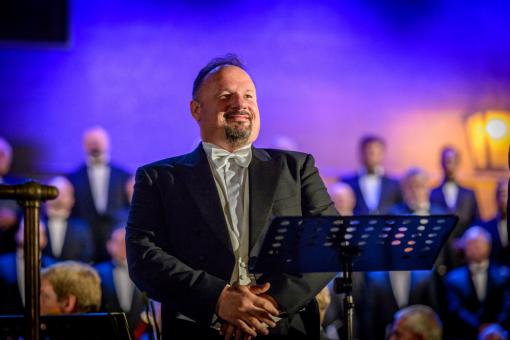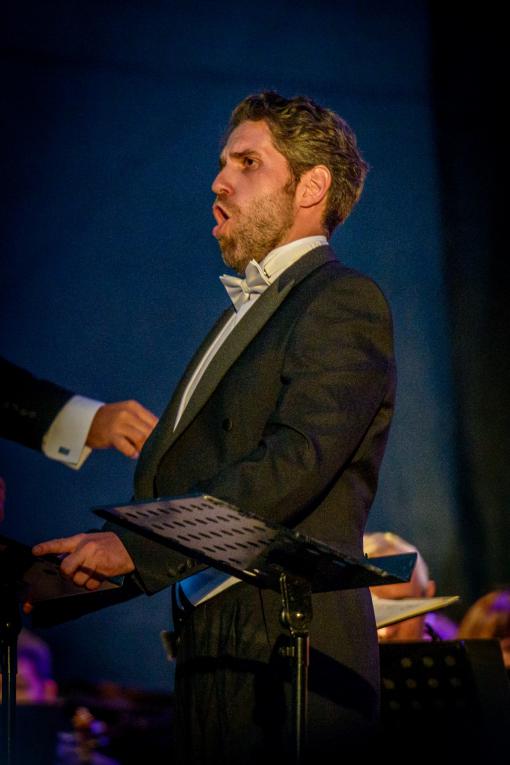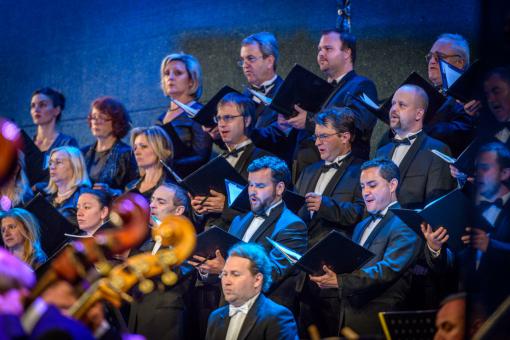The 17th annual Špilberk International Music Festival opened on Tuesday with a concert of the Brno Philharmonic Orchestra and the Czech Philharmonic Choir. The somewhat asymmetric program was filled with two well-known cantatas: Te Deum Laudamus by Antonín Dvořák and Carmina Burana by Carl Orff.
Dvořák's musicalization of the hymn Te Deum Laudamus has a cheerful character of nearly euphoric proportions. The Brno Philharmonic Orchestra under the baton of Leoš Svárovský plunged into the composition with gusto but in terms of interplay the beginning was a bit hesitant. The drums were falling behind the timpani playing in triplet motion and the orchestra as a whole was not convincing in the opening bars of the first sentence. On the other hand, the Czech Philharmonic Choir sounded phenomenal from the very beginning. Soprano Marie Fajtová performed well from the start. She sang with a strong vibrato and her voice filled the room. Baritone Peter Mazalán was also excellent. In the first passage, however, where both soloists were singing at the same time, Mazalán's colour and volume were not very assertive. But the second sentence of the cantatas worked well. From the perspective of dynamics, the sound came in beautiful waves and the female voices in the choir phrased perfectly. The phrasing in the final Hallelujah was equally impressive and the unfolding of both groups into the initial theme of the composition was majestic.
 In terms of length, Carmina Burana, a collection of medieval texts set to music by the German composer Carl Orff, exceeds Dvořák's cantata more than three times. In the opening O Fortuna, Svárovský let the orchestra and the choir strictly separate individual phrases and the sentence unfolded at a slower pace overall. The performers absolutely managed to create a completely desirable monumental pathos. The first slight hesitation of the choir came in the oriental styled Primo vere and it was in terms of entrance. The thematically sunny fourth part then allowed the rather soft voice of Peter Mazalán, who was somewhat overshadowed in the first half of the concert, to excel. The historicist Behold, glamorous and longed-for, sounded like summer and very fresh, the choir also coped with sections at high speeds.
In terms of length, Carmina Burana, a collection of medieval texts set to music by the German composer Carl Orff, exceeds Dvořák's cantata more than three times. In the opening O Fortuna, Svárovský let the orchestra and the choir strictly separate individual phrases and the sentence unfolded at a slower pace overall. The performers absolutely managed to create a completely desirable monumental pathos. The first slight hesitation of the choir came in the oriental styled Primo vere and it was in terms of entrance. The thematically sunny fourth part then allowed the rather soft voice of Peter Mazalán, who was somewhat overshadowed in the first half of the concert, to excel. The historicist Behold, glamorous and longed-for, sounded like summer and very fresh, the choir also coped with sections at high speeds.
The thematically ticklish section Uf dem Anger began with a purely instrumental dance. The orchestra was energetic and the sentence as a sequence of light times held together wonderfully. In the following predominantly five-time sentence, someone's voice was slightly sticking out in the women's choir but the intonation was excellent. After a lyrical flute solo in the ninth sentence, the audience enjoyed the great double tongues of trumpets and trombones in the whimsical tenth sentence.
 Probably the most humorous stretch of the entire composition called In taberna was somewhat of a challenge especially for Peter Mazalán at the beginning, who had to deal with large amounts of text in dotted rhythm. However, he succeeded in slower surfaces in the higher register. The rhythmic finish performed by the orchestra was properly abrupt. Tenor Jaroslav Březina performed in the comic song roast swan. The combination of Březina's falsetto, frullata of the trumpets and rhythmically playful choral refrain worked as it should have – it was witty, moving and sarcastic. The drinking thirteenth sentence was theatrical, but tasteful, the fourteenth did not lack explosiveness.
Probably the most humorous stretch of the entire composition called In taberna was somewhat of a challenge especially for Peter Mazalán at the beginning, who had to deal with large amounts of text in dotted rhythm. However, he succeeded in slower surfaces in the higher register. The rhythmic finish performed by the orchestra was properly abrupt. Tenor Jaroslav Březina performed in the comic song roast swan. The combination of Březina's falsetto, frullata of the trumpets and rhythmically playful choral refrain worked as it should have – it was witty, moving and sarcastic. The drinking thirteenth sentence was theatrical, but tasteful, the fourteenth did not lack explosiveness.
 The voice of soloist Marie Fajtová came back after a long pause in the lovers' fifteenth sentence. She phrased the dotted rhythms beautifully and kept up long held notes. Peter Mazalán was phenomenal in the following sentence of a considerably solo nature despite the long phrases in high positions. He accompanied the orchestra discreetly, with due subtlety. In the eighteenth sentence, the choir performed an impressive array of dynamic areas, in the nineteenth the relaxed erotic theme was then fantastically highlighted by the male part of the choir with their refined performance. The twenty-second sentence, in which Orff did not hesitate to use elements of cabaret, was musically the most humorous number thanks to its melodically banal chorus. Fajtová showed amazing coloratura before both groups entered the pompous Ave formosissima in the opera aria-like Dulsissime. The transition to the final O Fortuna was successful, it was just a pity that ostinato playing woodwind instruments did not stand out.
The voice of soloist Marie Fajtová came back after a long pause in the lovers' fifteenth sentence. She phrased the dotted rhythms beautifully and kept up long held notes. Peter Mazalán was phenomenal in the following sentence of a considerably solo nature despite the long phrases in high positions. He accompanied the orchestra discreetly, with due subtlety. In the eighteenth sentence, the choir performed an impressive array of dynamic areas, in the nineteenth the relaxed erotic theme was then fantastically highlighted by the male part of the choir with their refined performance. The twenty-second sentence, in which Orff did not hesitate to use elements of cabaret, was musically the most humorous number thanks to its melodically banal chorus. Fajtová showed amazing coloratura before both groups entered the pompous Ave formosissima in the opera aria-like Dulsissime. The transition to the final O Fortuna was successful, it was just a pity that ostinato playing woodwind instruments did not stand out.
Both cantatas were successful in the end, despite vastly different themes, and they followed each other up. Although it was a very decent opening of the festival, the first half could have been a little bit richer. A break after a short twenty minutes of play immediately puts the barely warmed-up listener back on their feet which is a shame. Moreover, it has only been four months since Dvořák's Te Deum Laudamus was last played in Brno. It is understandable, however, that the festival producers, focusing on the general public, chose a proven classic.
 Te Deum and Carmina Burana Antonín Dvořák: Te Deum laudamus op. 103, B. 176, Carl Orff: Carmina Burana. Marie Fajtová – soprano, Jaroslav Březina – tenor, Peter Mazalán – baritone, Czech Philharmonic Choir – choirmaster Petr Fiala, Brno Philharmonic Orchestra – conductor Leoš Svárovský, 16 August 2016, Špilberk, Brno. Part of the 2016 Špilberk International Music Festival
Te Deum and Carmina Burana Antonín Dvořák: Te Deum laudamus op. 103, B. 176, Carl Orff: Carmina Burana. Marie Fajtová – soprano, Jaroslav Březina – tenor, Peter Mazalán – baritone, Czech Philharmonic Choir – choirmaster Petr Fiala, Brno Philharmonic Orchestra – conductor Leoš Svárovský, 16 August 2016, Špilberk, Brno. Part of the 2016 Špilberk International Music Festival
































No comment added yet..